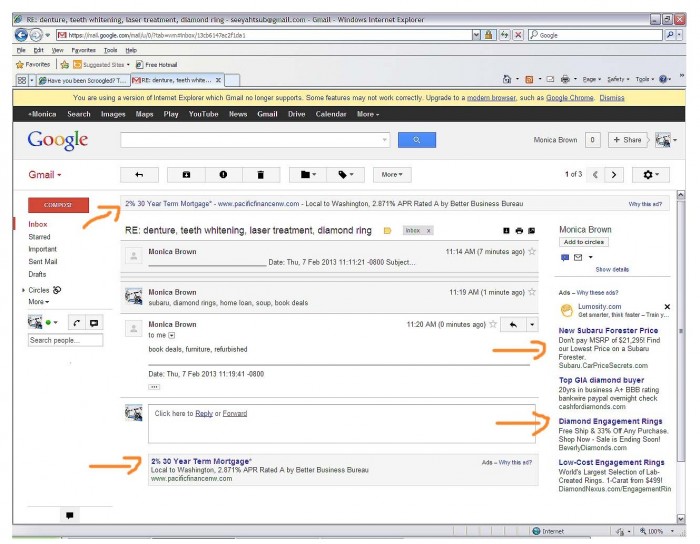By Monica Brown, Tulalip News Writer
Google is selling ad space according to what you talk about in your emails. Curiosity overcame me and I decided to check these solicited ads out myself and I found that they were there. I sent emails containing key words back and forth between two accounts and sure enough the ads adjusted to them. You can see in the photo they solicited diamond engagement rings, a Subaru Forester and home mortgage rates.

Opting out for the ads is not possible and changing your ad settings will continuously bring the user to a server timeout page. This is what Google has to say for their actions,
“…There’s what I call the creepy line and the Google policy about a lot of these things is to get right up to the creepy line but not cross it.” Says Eric Schmidt, Google executive chairman. Whether it’s about privacy or a large company profiting off of your private conversations it’s still your choice to partake.
Outlook.com has launched the Don’t Get Scroogled by Gmail national campaign in order to inform and educate people about how Google goes through your email contents in order to sell target ads. The campaign can be seen here at http://www.scroogled.com
Outlook.com wants to send the message to Google that going through personal email messages to sell ads is unacceptable and is encouraging consumers to sign the petition and tell Google to stop going through their emails to sell ads.
If consumers want to prioritize their privacy they can switch to Outlook.com, where they don’t read your emails and sell for ad space.
How the email skimming is done, Google goes through every single word of personal Gmail messages and uses that information to sell and target ads.As Google explains on its website,
“In Gmail, most of the ads we show appear next to an open email message and are related to the contents of the current email conversation or thread.” For example, if you write a friend to let her know you are separating from your husband, Google sells ads against this information to divorce lawyers, who post ads alongside it. Or if you ask a friend for vacation suggestions, Google will use this information to target you with ads from travel agencies or airlines that want your business.
Google will even use information from the emails of non-Gmail users to generate advertising income. Gmail goes through all incoming email messages, from any email provider, and sells ads based on the content of those emails — a practice that nearly 90 percent of Americans agree should end.
Currently, Google has six active class action lawsuits against them, all alleging illegal eavesdropping or interception under federal and state wiretapping laws, related to Google’s scanning of emails.
“Emails are personal — and people feel that reading through their emails to sell ads is out of bounds,” said Stefan Weitz , senior director of Online Services at Microsoft. “We honor the privacy of our Outlook.com users, and we are concerned that Google violates that privacy every time an Outlook.com user exchanges messages with someone on Gmail. This campaign is as much about protecting Outlook.com users from Gmail as it is about making sure Gmail users know what Google’s doing.”
New GfK Roper Poll: Public Largely Unaware and Strongly Disapproves of the Practice
A new GfK Roper poll, commissioned by Microsoft, shows that only 30 percent of Americans are aware that any email service goes through the content of personal emails to sell ads, and 88 percent of consumers disapprove of this practice.
Key results from this survey include the following:
- 88 percent of Americans disapprove of email service providers scanning the content of your personal emails in order to target ads, and 52 percent disapprove strongly.
- 89 percent of Americans agree that email service providers should not be allowed to scan the content of personal emails in order to target ads.
- 83 percent of Americans agree that email service providers scanning the content of your personal emails to target ads is an invasion of privacy.
- 70 percent of Americans didn’t believe or didn’t know that any major email service provider scans the content of personal emails in order to target ads.
- 88 percent of email users believe that email service providers should allow users to “opt out” if they prefer that the content of their emails not be scanned in order to target ads.
Outlook.com believes their users should be informed about Google’s email privacy intrusions and consumers have a choice to switch to Outlook.com.
“Outlook.com believes your privacy is not for sale,” Weitz said. “We believe people should have choice and control over their private email messages, whether they are sharing banking information or pictures of their family or discussing their medical history.”
Weitz added, “Outlook.com does not scan the contents of your personal email to sell ads. Outlook.com is an email service that prioritizes your own and your family’s privacy. You wouldn’t let the post office look inside your mail, so why would you let Google?”
Founded in 1975, Microsoft (Nasdaq “MSFT”) is the worldwide leader in software, services and solutions that help people and businesses realize their full potential.
1 About this study: The RDD telephone survey was conducted Feb. 1-4, 2013 by GfK’s Public Affairs & Corporate Communications division, among a nationally representative sample of 1,006 adults ages 18 or older. Interviews were conducted with 753 respondents on landlines and 253 respondents on cellular telephones. The data were weighted on age, sex, education, race and geographic region. The margin of error on results based on the full sample is plus or minus 3 percentage points.
Source: Scroogles.com
